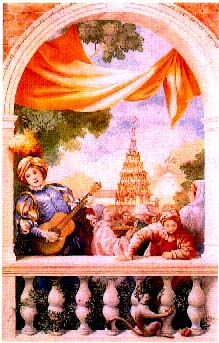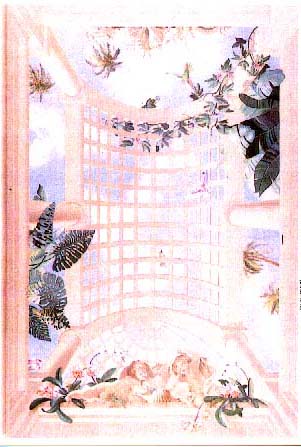| |
WEST COAST DECORATIVE PAINTERS Traditional Disciplines Applied with Contemporary Spirit
By Hunter Drohojowska
© Architectural Digest, May 1991
Page 3
|
Mark Evans and Charley Brown began their
San Francisco-based collaboration six years ago. Although at
first excited by the murals at the Villa Maser and the Palazzo
Labia in Venice, they now create wall, ceiling and floor paintings
ranging in style from the Italian Baroque to 1930s Americana
to contemporary imagery.
Evans
has a fine-arts degree from Indiana University and Brown has
a master of fine arts from Humboldt
State University. Evans worked in advertising for a time, while
Brown exhibited at galleries, but both were unsatisfied until
their foray into decorative painting, a career that got its
start when they decorated their own house in a manner they
describe as "bombed-out palazzo." "It was fun, and we saw potential
for a historic art form in a contemporary setting," says Evans.
Soon, designers were offering them commissions. Brown, along
with assistants, recently completed seven ceilings for a residence
in Hawaii.
|

ABOVE: Carlo Marchiori's mural of a country
festival, painted in a manner inspired by Tiepolo, is an
inventive interpretation of 18th-century Venetian painting
that reveals the artist's appreciation for his Italian heritage.
Photo by Douglas Keister
|
In
the master bedroom, he painted a view of the sky above an arched
trellis supported by columns and stone putti.
"Our
works are not copies of existing murals," explains Brown. "We do
a lot of research on a period and then paint in that style -- which
is more interesting." Evans notes, "There is often an element of
surrealism. We try to put a twist on everything we do."
Garth
Benton, a cousin of the painter Thomas Hart Benton, has been interested
in art since the time his father gave him a book on his counsin's
paintings. He went on to study art at Art Center College of Design
and at UCLA. In 1971 he received his most important assignment --
murals for the J. Paul Getty Museum. He won the commission with extensive
renderings in the first-century-Roman style based on his research
at the Metropolitan's cubiculum -- a rebuilt Pompeian room with original
frescoes.
|

ABOVE:
Tropical foliage and fantasy architecture in Renaissance and
Baroque styles are integrated
into a ceiling mural by Mark Evans and Charley Brown -- one
of a series of seven commissioned for a Honolulu residence.
Photo by David Papas
|
He
makes similar investigations for many of his murals, drawing
upon stylistic influences that
include ancient Chinese, seventeenth-century French, Indian
and Art Deco. "By reading, studying and researching, I immerse
myself in the culture and art history of a particular civilization," Benton
has said. "I rarely just copy existing art. Rather, I interpret.
What emerges is new art, painted by me."
Carlo
Marchiori, who lives in San Francisco and Calistoga says, "I
paint because I am Venetian, educated and influenced by Palladio,
the Bassanos,
Veronese and the Tiepolos. They lived in my neighborhood. love
to speak through my work about this culture, in their very
dialect and with their airs and visions."
|
Marchiori's
murals are reminiscent of frescoes found in Italian villas. he went to
art school in Padua and to the Instituto d'Arte in Venice, graduating
with a master's degree. His education stressed the established techniques
of decorative art-- fresco, trompe-l'oeil, perspective and drawing in
a disciplined studio environment. At first he worked in comercial art,
including animation. But after moving to California ten years ago, he
returned to his heritage. "I like large projects where I can interpret
the Palladian style. I make it whimisical and my own, otherwise it has
no life." His mural of a country festival in Italy is in the style of
Tiepolo, but he relies on his memory as much as on art history. "I went
all over the world and realized my roots were quite interesting," says
Marchiori. "If I had stayed at home, in Italy, I probably would never
have recognized this."
|




